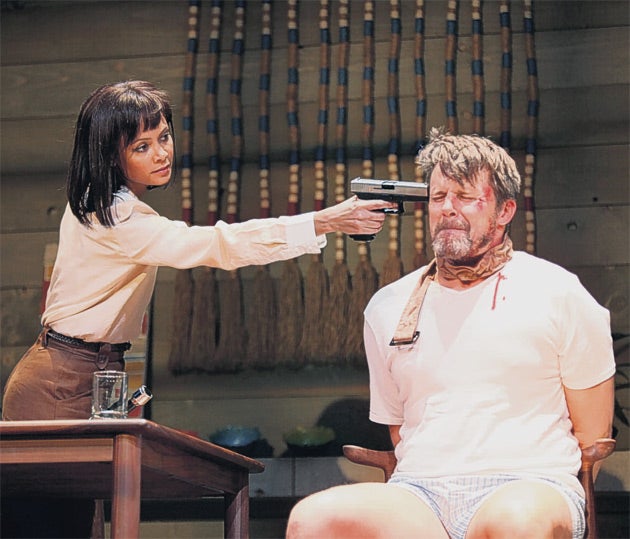Death and the Maiden, Harold Pinter Theatre, London

What better work to inaugurate the newly named Harold Pinter Theatre (formerly the Comedy) than Death and the Maiden? Pinter was a friend of Ariel Dorfman, and, influentially, championed this 1990 piece. With its focus on the after-effects of political torture and the hideously vexed issue ofhow you achieve justice in a society emerging from violent dictatorship, the play’s revival now feels particularly timely in the light of post- Gaddafi Libya.
So it’s dismaying to report that Jeremy Herrin’s miscast production, starring Thandie Newton, fails to rise to the doubly auspicious occasion.
Set in an unnamed South American state (akin to the author’s native Chile after the fall of Pinochet), the play engineers a sensational scenario. Chance brings Paulina Salas face to face with the man she believes repeatedly raped and tortured her 15 years previously. She was blindfolded throughout her ordeals, so she “recognises” him from the sound of his voice. Now, bound and gagged, this doctor is at her gun-wielding mercy. To the horror of her husband, a human rights lawyer who has just been appointed to a truth and reconciliation committee, she is intent on extracting a confession at any price.
Making her stage debut as Paulina, Thandie Newton turns in a proficient, but underpowered and vocally strained performance, utterly lacking in the unnerving, incandescent intensity brought to the role by Juliet Stevenson in the Royal Court premiere 20 years ago. You should at once feel wrenched by the character and want to recoil from her. If she’s in the grip of a dangerous delusion, this is itself is a mark of the psychological damage she suffered through torture. Shemay risk jeopardising the transition todemocracy by her lust for private, extra-judicial vengeance, and, yet, should cases such as hers (that didnotendinmurder) submit to the silence of official oblivion?
But instead of arousing ambivalenceby seeming to tumble from the same turbulent source, the exultant vindictiveness and tearful vulnerability in Newton’s portrayal feel like alternating poses between which she shifts with mechanical care. As the lawyer husband, Tom Goodman-Hill isbetter at creating the requisite sense of equivocality. You can sometimes catch a cold glint of irked personal ambition in his distraught advocacy of pragmatic idealism. And the affronted, apparent decency of Anthony Calf as the accused keeps you guessing throughout. But, neither sufficientlytense nor emotionally disorienting, this is not the first-rate revival the occasion deserved.
To 21 January (0844 871 7627)
Subscribe to Independent Premium to bookmark this article
Want to bookmark your favourite articles and stories to read or reference later? Start your Independent Premium subscription today.

Join our commenting forum
Join thought-provoking conversations, follow other Independent readers and see their replies